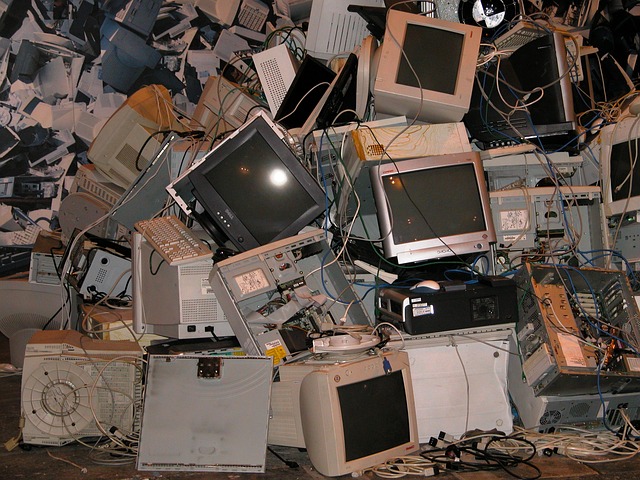
Electronic Waste Recycling: All Things To Take Note Of 📱
Electronic Waste Or E-Waste Recycling 📱: When one thinks of recycling, things like plastic, paper, cardboard, metal, or glass always come to mind. I know for a fact that I always see articles that use those as the main topic – because I do that quite a lot, as well! Of course, that is because they are always ever-present and needs dealing with.
>Download Now: Free PDF Business Owners Guide To Commingled Recycling Bin Services
Nowadays, you can add electronic waste to the “long list” of things to recycle. Electronic waste (also called e-waste), is a growing problem that needs to be solved ASAP. But before that, you should know everything about it. That is where we come in. We, Waster, will discuss everything about it today. Read on to learn more.
A bit about Waster
Before we discuss everything about electronic waste (or e-waste) recycling, let me share with you more information about Waster.

We here at Waster provide you with innovative solutions for your and your business’s waste management and recycling needs. Furthermore, we provide flexible, 30-day contracts instead of the typical lock-in contracts, which proves to be better.
Click on the blue button to learn more.
READ: Plastic Recycling Innovation ⚙️
Recycling electronic waste is a must!
Think of this scenario:
“You bought a new phone in the summer of 2016. Then, last 2019, you accidentally dropped your phone on the floor. As a result, the LCD screen cracked, but it is still fixable. However, you decided to just get a brand new phone and dispose of the old one.”
As a result of this, the old phone is now considered electronic waste or e-waste.
What is e-waste, exactly? As the description suggests, it simply means any electronic items or devices not needed anymore and disposed of. Aside from electronic waste or e-waste, it is also called WEEE (waste electrical electronic equipment).
In short, e-waste is any unwanted electronic product. When we think about electronic waste, examples everyone should know or use include:
- mobile phones
- computers/computer parts
- printers
- tablets
- fridges
- radios
- electronic gym equipment like a treadmill
- digital watches
- microwave oven
There are a lot more examples, but these are the most recognisable. Along with learning electronic or e-waste recycling, let us also discuss how it is produced.
How is e-waste usually produced?
Technology is ever-evolving on a daily. Every day, when you read the news, many reports usually contain information on a certain new gadget or appliance. New features, better battery life, or a more environmentally friendly approach – those are the stuff that is usually reported.
The question: what happens to the old ones? Answer: unfortunately, the consumer ultimately just decides to discard the product instead of having it fixed. After all, many of us will find it much better – cheaper, even – to replace rather than fix.
Additionally, when it comes to gadgets like phones or gaming consoles, newer models come out fairly often – once every few years, while the others yearly.
The issue now is the old electronic items do not have any use anymore, resulting in more e-waste than what we would want. In the next section, we will discuss the negative impacts this brings.
Negative effects
Recycling electronic waste should be a priority. Failure to do so will harm the environment.
Now, why do you think e-waste is considered dangerous? First, the reason for that is because they usually contain harmful chemicals.
Imagine that going into the ground. Usually, e-waste, unfortunately, ends up in landfills. The harmful chemicals will mix with water, resulting in what we would call leachate.
This hazardous water harms the ground by turning it hazardous, as well. Moreover, the situation presented will result in harming the animals and people near the vicinity.
Electronic recycling as the solution
Of course, the solution to this is recycling electronic waste. Everyone would agree when we say this. The first thing to do is to consult with your local council and enquire about facilities that accept such waste.
Also, you can find facilities online. Send your e-waste for recycling to proper establishments which you can find in Planet Ark’s Recycling Near You page.
Collect the e-waste and drop it off at the designated location found on the page. You will find the four approved organisations to deal with your electronic waste – TechCollect, Drop Zone, eCycle Solutions, and Electronic Product Stewardship Australasia (EPSA).
Other options you can consider
Recycling is not the only option you have when it comes to electronic waste. In this part of the section, we will provide you with others that you can deliberate over.
1. Fixing it yourself – Now, we know you may not be a repairman who can easily fix broken stuff with ease and swiftness, but it is still worth examining the electronics instead of disposing of it immediately. By doing so, you (1) save lots of money and (2) help keep the environment safe.
2. Sell or give it away to someone you know – This is especially true if the electronics you intend to replace is your mobile phone or gaming console. For example, we take a look at the 5th Playstation, or PS5, for short. You might own a PS4 and intend to replace it with the latest model. What you can do with that is either sell it – as it still has value – or give it to someone you know, like a family member or friend.
3. Donate it to those who need it – There are many less fortunate people who might need certain appliances. You may have what they need. Donate your old ones instead of discarding them.
Electronic waste recycling: Waster’s final thoughts
Electronic waste is something we all should be aware of. It is a growing problem all over the world. Recycling electronic waste is something you should look to do instead of ending up in a landfill.
Waster: things you need to know
If you’re looking for different bin services, check our waste recycling shop and find the best deals in terms of pricing and services.
Also, please call 1300 WASTER (1300 927 837), or email us at enquiries@waster.com.au if you have any further questions.
2 Comments
Leave a Reply Cancel reply

Product categories
Most Popular Posts
-
Commercial Waste Management Services: Reduce Waste Collection Costs! 🚍
-
Medical Waste Disposal: Everything You Need To Find Out In 2024! 💉
-
Rubbish Removal Sydney 2024: Better Bin Collections For Business ✅
-
Clinical Waste Disposal 2024: What To Know About Business Clinical Waste ⚕️
-
Secure Document Destruction 2024: All About Security Bins Shredding 🔒
-
Free Cardboard Recycling 2024: Can I Get Free Cardboard Collection? 📦
-
Confidential Paper Disposal Bins 2024: What You Need To Know About Shredding! 🔒
-
Recycling Bins Australia 2024: Recycling Can Boost Your Profits! ♲
-
Commercial Wheelie Bin Collection: What Businesses Need To Know In 2024 🗑️
-
Commingled Recycling 2024: Why Commingled Bin Is Key To Recycling 🍾















Working to bring developers, builders and homeowners cutting edge green technology would really help in our advocacy to green living. Informative article. Lets go green!
I am a civil engineer and I am looking into the construction industry as my specialty using geosynthetic Technology. I believe that it has a more positive impact on the community and high quality innovation. It is so nice to see articles like this to enhance my skills.